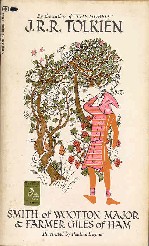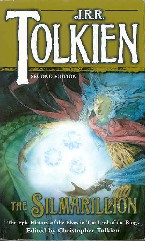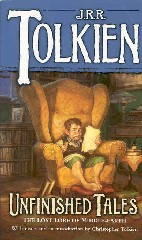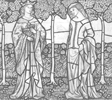J. R. R. Tolkien
If you don't know who this guy is, you landed on this site by accident. (DBW)
|
 Smith Of Wootton Major and Farmer Giles Of Ham (1967, 1949) Smith Of Wootton Major and Farmer Giles Of Ham (1967, 1949)
Tolkien's two best-known non-Middle Earth works, short novellas packaged together as a single paperback, are entertaining but a bit lightweight.
"Wootton Major" is an engaging, typically majestic tale of a smith who travels back and forth between his village and Faery, and interacts with a mysterious cook who turns out to be something other than what he seems.
It's actually Dunsany-like, not so different from (say) Elfland's Daughter, and worth reading, although it's a bit drab.
"Farmer Giles" is a hoot, the only case where Tolkien let his hair down and wrote an extended piece of humor.
The earthy, egotistical Farmer Giles' almost non-chalant conquests of an amusingly dimwitted giant and a not-quite-as-clever-as-he-thinks dragon are non-stop fun, and Tolkien knows how to quit before he outwears his welcome.
There's no particular reason for Middle Earth obsessives to take this kind of a detour, except that the man's tremendous writing skills are fully on display. (JA)
I don't remember Wootton Major, but Giles is indeed a blast. (DBW)
|

|
|
|
The Silmarillion (1977)
 - Tolkien's big labor of love, arguably more important to him than even the Trilogy, is kind of a drag.
Laying out Tolkien's incredibly detailed history of the First Age (remember, LOTR takes place in the Third Age), the book was patched together by Tolkien's son Christopher from multiple drafts written almost over Tolkien's entire adult life.
In places the writing has the easy, assured tone of Tolkien's better-known works, but in passages drawn from early manuscripts, it's rigid and almost like the Old Testament in its attention to historical detail at the expense of (say) little things like dialogue, pacing, and characterization.
The first third, concerned with Tolkien's Norse and Greek pantheon-like cosmology, is especially painful; it might just stop you cold before you get to the substantially more enjoyable tales of elven kingdoms fighting it out over the ages with Sauron's more powerful predecessor Morgoth - men and dwarves are minor characters here, and hobbits, with all their humor and humanity, are completely absent.
Still, Tolkien whips out a large array of different characters and episodes, many of which are quite interesting, so if you're going to be a saint and actually finish the book you'll find it rewarding - I can't remember, but I think I failed to do so at age 11 when it came out; it was the most eagerly received Christmas present of my entire childhood. (JA) - Tolkien's big labor of love, arguably more important to him than even the Trilogy, is kind of a drag.
Laying out Tolkien's incredibly detailed history of the First Age (remember, LOTR takes place in the Third Age), the book was patched together by Tolkien's son Christopher from multiple drafts written almost over Tolkien's entire adult life.
In places the writing has the easy, assured tone of Tolkien's better-known works, but in passages drawn from early manuscripts, it's rigid and almost like the Old Testament in its attention to historical detail at the expense of (say) little things like dialogue, pacing, and characterization.
The first third, concerned with Tolkien's Norse and Greek pantheon-like cosmology, is especially painful; it might just stop you cold before you get to the substantially more enjoyable tales of elven kingdoms fighting it out over the ages with Sauron's more powerful predecessor Morgoth - men and dwarves are minor characters here, and hobbits, with all their humor and humanity, are completely absent.
Still, Tolkien whips out a large array of different characters and episodes, many of which are quite interesting, so if you're going to be a saint and actually finish the book you'll find it rewarding - I can't remember, but I think I failed to do so at age 11 when it came out; it was the most eagerly received Christmas present of my entire childhood. (JA)
 - Let's face it: Tolkien was a nut. An incredibly talented nut, but a nut all the same. All the languages and races and thousands of years of history weren't sprinkled throughout LotR to give the illusion of depth: he really did create an imaginary world of unfathomable depth, over a period of decades. And thanks to Christopher, you can read as much of the backstory as you want. This scholarly tome is written like a history book, and the principal narrative about the fallen angel and the stolen talisman and the Great War is 1) just Christian allegory to start with; and 2) the exact same plot as the Lord of the Rings.
(DBW) - Let's face it: Tolkien was a nut. An incredibly talented nut, but a nut all the same. All the languages and races and thousands of years of history weren't sprinkled throughout LotR to give the illusion of depth: he really did create an imaginary world of unfathomable depth, over a period of decades. And thanks to Christopher, you can read as much of the backstory as you want. This scholarly tome is written like a history book, and the principal narrative about the fallen angel and the stolen talisman and the Great War is 1) just Christian allegory to start with; and 2) the exact same plot as the Lord of the Rings.
(DBW)
|

|
|
|
Unfinished Tales (1980)
 - Argh, if only J. R. R. had gotten his act together and finished some of the stuff he started before retiring and just losing it.
This book cobbles together the best of Tolkien's Middle Earth-related writing fragments, including an excellent hundred-page epic story of the First Age - arguably Tolkien's most poignant tragedy - that just stops in the middle; some reasonably entertaining stories about the second age (dominated by the Numenor, Aragorn's half-elven ancestors); and several mostly historical-style accounts of key episodes in the history of the Third Age, none of which are important enough to have gone into the Trilogy.
It's an incoherent grab-bag, but frankly it's more fun in many places than The Silmarillion, and if you've read LOTR three or more times you might get some relief by moving on to this stuff.
Listen, you don't want your eyeballs to fall out of your head.
After this Christopher Tolkien put out a long series of other manuscripts by his father, none of which seem important, since frequently the material is just early drafts of works like the Trilogy and The Silmarillion. (JA) - Argh, if only J. R. R. had gotten his act together and finished some of the stuff he started before retiring and just losing it.
This book cobbles together the best of Tolkien's Middle Earth-related writing fragments, including an excellent hundred-page epic story of the First Age - arguably Tolkien's most poignant tragedy - that just stops in the middle; some reasonably entertaining stories about the second age (dominated by the Numenor, Aragorn's half-elven ancestors); and several mostly historical-style accounts of key episodes in the history of the Third Age, none of which are important enough to have gone into the Trilogy.
It's an incoherent grab-bag, but frankly it's more fun in many places than The Silmarillion, and if you've read LOTR three or more times you might get some relief by moving on to this stuff.
Listen, you don't want your eyeballs to fall out of your head.
After this Christopher Tolkien put out a long series of other manuscripts by his father, none of which seem important, since frequently the material is just early drafts of works like the Trilogy and The Silmarillion. (JA)
 - "Narn I Hîn Húrin" is terrific, probably the Tolkien fragment that best captures the sweep and drama of the Trilogy... it's so iconic I keep thinking he must've ripped it off from some old Icelandic myth. But the rest is only intermittently interesting.
I got off the Christopher-digs-though-the-archives train soon after this: I have the Book of Lost Tales Volume I, but don't remember it well enough to review it.
(DBW) - "Narn I Hîn Húrin" is terrific, probably the Tolkien fragment that best captures the sweep and drama of the Trilogy... it's so iconic I keep thinking he must've ripped it off from some old Icelandic myth. But the rest is only intermittently interesting.
I got off the Christopher-digs-though-the-archives train soon after this: I have the Book of Lost Tales Volume I, but don't remember it well enough to review it.
(DBW)
|

|
|
|

